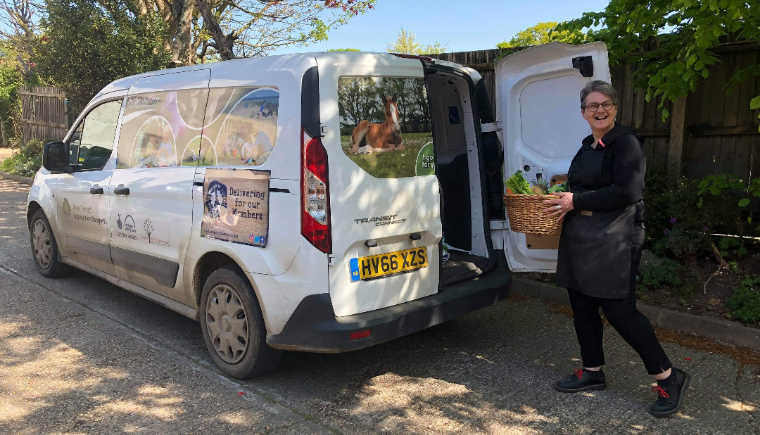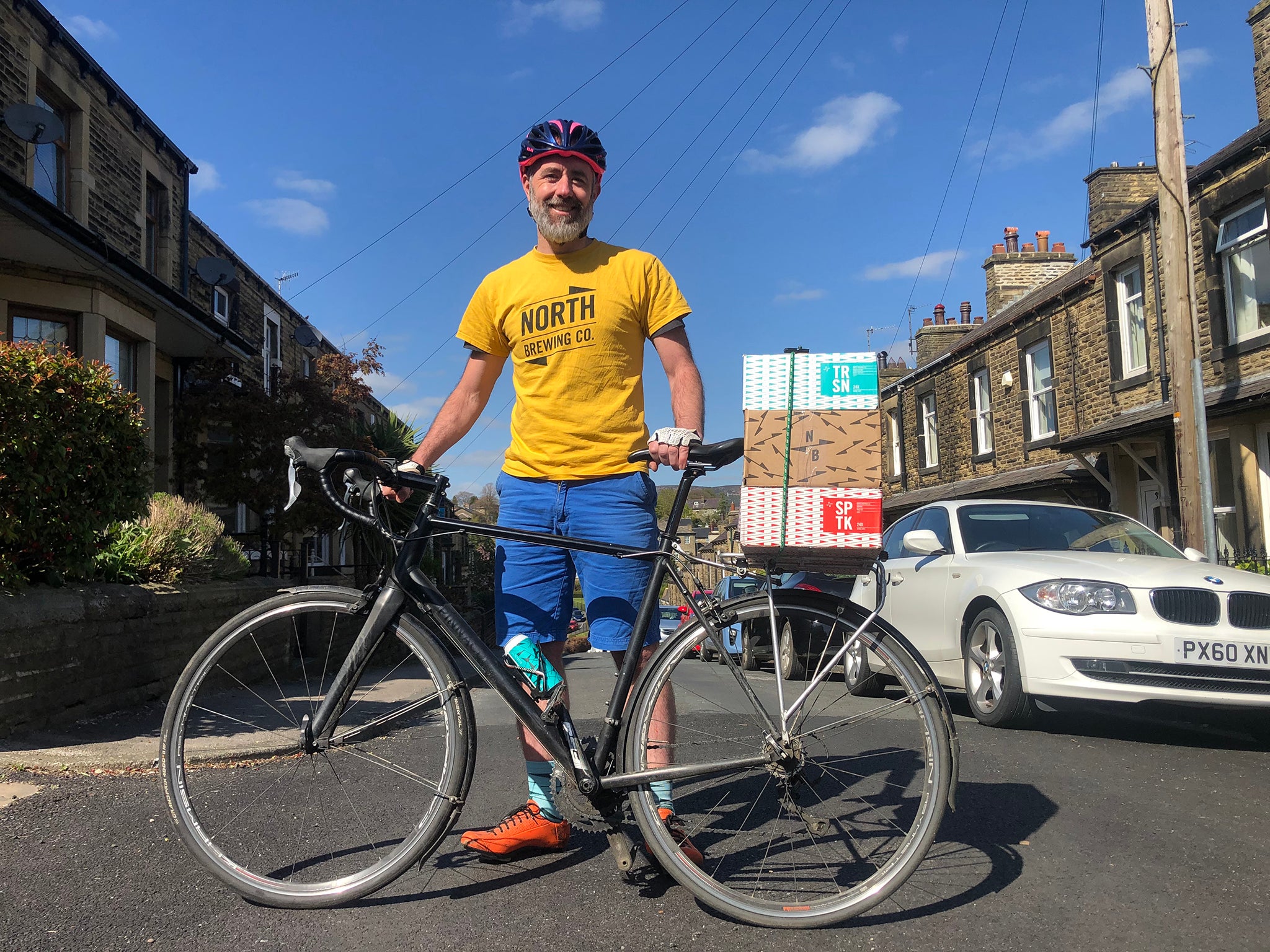Butchers on bikes and veg by van: How coronavirus has made us shop like our grandparents – and taken local outlets back to the future
Independent grocers, bakers, fishmongers and brewers have adapted to crisis by going mobile for first time in decades – and, for many, doorstep trade is booming

It is a pandemic that has spread misery across the world, brought economies to their knees and entrapped millions of people in their own homes.
The coronavirus has also, it seems, made many of us shop and eat like our grandparents.
While some customers continue to struggle with supermarket queues and futile attempts to get a delivery slot from the country’s biggest chains, thousands of Brits are reverting to more traditional means of buying food.
Independent butchers, fishmongers and fruit and veg traders across the country have gone mobile – and many are reporting a roaring trade in doorstep orders. They have borrowed vans, converted bikes and, in some cases, repurposed the family car to deliver everything from bread baked fresh that morning to kegs of beer.
And, it seems, amid otherwise bitterly bleak times for retail industries, such efforts have resulted in something of a mini renaissance for local food shops selling produce while out and about.
“Some of our members are reporting a treble in trade since the lockdown,” says Richard Stevenson, technical manager with the National Craft Butchers association. “That’s despite the fact many have had to close their bricks and mortar shops. They’re saying they’re busier than at Christmas. A lot are wondering why they didn’t do deliveries years ago.”
Exact numbers quantifying the new – but old-fashioned – trend are, so far, sparse.
Nonetheless, data generated by the Information Impact Company charity suggests local neighbourhood shops are among those that have remained least effected by the pandemic. Simultaneously, informal estimates by the British Independent Retailers Association indicate deliveries by such businesses have grown from accounting for less than 20 per cent of trade to well above 85 per cent in the last month.
“Before mass car ownership or supermarkets, butchers on bike and fruit and veg vans were how our grandparents shopped – delivery wasn’t born with Amazon,” says BIRA chief executive Andrew Goodacre. “So, this is a real case of going back to the future. And we’re seeing it across the board: grocers and butchers yes but also bakers, coffee shops, brewers, even local toy stores.”
Crucially, analysts appear to believe the shift will be permanent. Mobile services look set to become common practice even after the pandemic eases.
“Delivery was increasing among our members anyway because there was a recognition that convenience was king,” says Goodacre. “This has just accelerated what may have been a five-year progression into six weeks.”
It is a conclusion that many traders who The Independent speak to fully concur with.
“Delivery does raise logistical issues for a small business but it had to become a thing,” says Kathy Sirl, owner of the Naked Pantry, a zero-packaging grocery in New Milton, Hampshire, which has seen sales increase by 40 per cent since going mobile only. “Maybe, as independents, we’d missed a trick and allowed supermarkets to get ahead on this but I think necessity has meant we’ve really stepped up.”
Such stores have arguably seen their stock rise because they have been able to provide three things the chains have not: a quick turn-around time on deliveries; more quality local produce for people who – in the absence of being able to go out – want good food at home; and, pertinently, a more personal touch. Albeit a more personal touch which, for the time being, is from the end of the drive.
“We’ll quite often stop and have a chat from the garden gate,” says Sirl, whose shop does everything from fresh fruit and veg to locally made chutneys and cereals. “It’s lovely to be able to offer that brief sense of normality and community to someone who perhaps hasn’t been out the house all day. You don’t get that with a Tesco van, do you?”
She herself has especially innovated by taking up an offer to use a ranger van from New Forest National Park – vehicles which would otherwise have been sat idle during the lockdown.
“But when all this is over, we will certainly be looking to acquire an electric van to keep the service running,” she says.
Is it proof that our grandparents had it right all along, one wonders. “It’s certainly proof that good ideas are timeless,” she replies.
The revelation that such shops are riding out – and in some cases, growing – comes as a bright spot in otherwise dark times for industries operating in the food chain.
Hundreds of producers, wholesalers and farms say the bottom has fallen out of their business since the government shut restaurants, hotels and cafes last month. Such venues, themselves, meanwhile, are looking at a “bloodbath”, according to Kate Nicholls, chief executive of UK Hospitality. A third of pubs and restaurants could shut as a result of the pandemic, she told MPs on Tuesday.
More widely, overall consumer spending is estimated to have fallen by a third – a drop in scale simply never before known in the UK.
Yet, the ability of independents to adapt quickly shows a much-needed resilience in at least one part of the food chain that bodes well for the future, according to Goodacre, of BIRA, again.
“These small businesses have proven, as they have done down the decades, that in times of crisis, they are the backbone of the country,” he says. “I’m convinced that those who weather this storm will come out stronger because they will have expanded their offering.”

For Diane Blackwell, who runs Blackwell’s, a butcher in Stockton-on-Tees, the new crisis will not be the first time the shop has done a doorstep service.
When the place was opened by her father-in-law in 1954, he would get on his bike every day to deliver meat to customers across town.
Now, after a pause of more than five decades, the service is back – “although not the bike”, adds 60-year-old Diane hastily.
Rather, she has borrowed a couple of vans from a temporarily closed catering company so Blackwell’s can drop off meat, dairy and cakes across the region, while the shop itself has been temporarily closed.
“We’re doing about 400 deliveries a week, which is about 70 per cent of what we expect to sell in shop,” says Diane. “Overall, that’s a loss of business, which clearly isn’t ideal, but what we’re doing is keeping us ticking over.”
Although she had to furloughed a portion of her 24 employees, she hopes that by driving up doorstep sales and reconfiguring the butchery to give staff more space, those that want to come back before the lockdown ends will be able to.
Unlike Blackwell’s, Christian Townsley’s company had never previously done deliveries.
Indeed, he perhaps produces the one essential that was not offered by mobile traders in a bygone era: beer.
“I don’t think there’s any history of this because, basically, if your grandma or grandad wanted a drink, they went out to the local,” says the director of North Brewery in Leeds. “So we’re making it up a little bit as we go along.”
Inevitably, he has seen his sales to pubs – which accounted for about 80 per cent of all trade – stop completely. His response has been to scale up his canning line and offer fee delivery to anyone in a three-mile radius of the brewery. He has personally done a lot of drops on a converted bike but staff have been driving it round in their own cars too.
So far, they’re selling an average of 2,000 cans a day.
“Well, you need a drink in lockdown, don’t you?” says 45-year-old Townsley.
Indeed, it is something the wider brewing industry is finding. While sales initially dropped by 82 per cent, according to the Society of Independent Brewers (SIBA), there has since been a 55 per cent pick up in online sales with 70 per cent of breweries adapting to do delivery booze.
Many remain in a “fight for survival”, says Neil Walker, of SIBA, but the willingness to adapt shows a determination not to be defeated by the crisis.
For them – as for independent food retailers everywhere – relying solely on doorstep custom will, of course, not be a sustainable solution indefinitely.
But there is some hope that, if the tunnel can be negotiated, the light at the end will see such businesses grow and expand as many shoppers continue to buy local long after the crisis is over.
Join our commenting forum
Join thought-provoking conversations, follow other Independent readers and see their replies
Comments
Bookmark popover
Removed from bookmarks